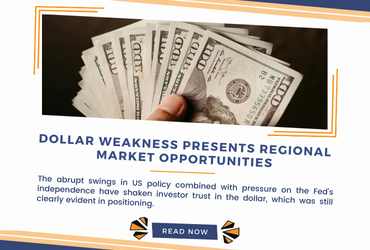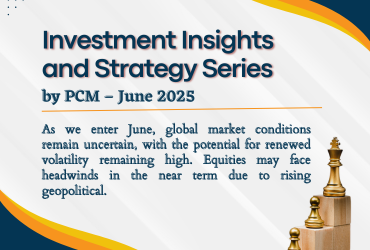
In 2023, the stock market has been dominated by a select group of mega-cap US tech companies, commonly referred to as the “magnificent 7.” These companies include Apple, Microsoft, Alphabet, Amazon, Nvidia, Tesla, and Meta (formerly known as Facebook). Their strong performance has left little room for other markets to outshine the US market. In our local market, the FBM KLCI index has experienced a decline of 5.94% year-to-date when measured in local currency terms and nearly 9% in USD terms. As a result, it has underperformed in comparison to its regional counterparts, with only a slight edge over the Thailand market, which has declined by 8% year-to-date.
After experiencing several months of foreign net outflows in the Malaysian equity market, there has been a notable change in July, with foreigners making a return and buying RM363 million worth of Malaysia equities. This influx of foreign investment has had a positive impact on the ringgit’s value against the dollar (the ringgit has appreciated by 2.58% against the dollar month-to-date), indicating some excitement and confidence among investors irrespective of the uncertainties ahead of the state elections next month. Of course, investors will continue to closely monitor the development of the state election, but we believe it is unlikely to see any changes occurring in the state government.
In addition, we believe that there are numerous catalysts present in our local market, which gives us reasons to remain optimistic and look for potential opportunities.
1. Malaysia sees benefit from trade diversion
Notwithstanding the trade war effects, Malaysia stood to benefit arising from trade diversion when the US and China substituted their demand for imports from each other to other emerging markets, including Malaysia. Also, multinational corporations (MNCs) opted to relocate their operations to circumvent the high tariffs, with some MNCs choosing Malaysia. This led to an increase in manufacturing investments and generated trade and investment spillovers into the country. MNCs opted to relocate their operations to Malaysia thanks to our high degree of trade openness and low tax environment. The sectors that benefitted the most are Tech & E&E in Malaysia.
Interestingly, we continue to see positive momentum of approved FDI into Malaysia. Specifically, there was a notable surge in Net FDI (Foreign Direct Investment) in 2022, reaching RM73 billion, as multinational corporations (MNCs) continued to expand their capacity in the country. However, in the first quarter of 2023, FDI has moderated, declining to RM12 billion, primarily due to global economic weakness.
2. Chinese tourists to boost Malaysian growth
The reopening of China’s borders has brought a delayed but much-needed boost to Malaysia’s tourism industry. Prior to the pandemic, Chinese tourist arrivals were at 12% of the pre-pandemic level, while the tourist receipts stood at 19%. This indicates that Chinese tourists exhibited stronger spending power compared to other tourists visiting the country. In 2023, while the Chinese tourist arrival numbers have not yet fully recovered to pre-pandemic levels, given the need to obtain visas and the reduced frequency of flights. Nevertheless, it is expected that the situation will gradually normalize moving forward, as travel restrictions ease and flight frequencies increase.
3. Malaysia possesses robust fundamentals and is currently trading at an attractive valuation.
Malaysia’s economic fundamentals are notably stronger than during the Asian Financial Crisis (AFC) period. In the first quarter of 2023, the country’s GDP grew by 5.6%, and the growth forecast for the year is expected to be between 4% to 5%. Moreover, foreign shareholding has reached an all-time low, standing at 19.9% as of June 30, 2023, compared to 18.1% recorded at the end of 2002/03. Additionally, the KLCI is currently trading at depressed valuations, 1.5 standard deviations below the forward price-to-earnings (P/E) ratio & 2 standard deviations below the historical price-to-book (P/B) ratio.
Figure 1: FBM KLCI Forward P/E Ratio

Source: Bloomberg, 20 July 2023
Figure 2: FBM KLCI P/B Ratio

Source: Bloomberg, 20 July 2023
Where to position?
The market currently presents several opportunities for investors. However, it is crucial to exercise caution and carefully select investment options to ensure the best risk-adjusted returns. By taking a vigilant and discerning approach, investors can potentially reap the benefits of the current market opportunities while minimising risks.
Phillip Capital Malaysia offers a comprehensive suite of financial services including managed accounts and unit trusts, that may suit your investment preferences and financial goals. We also offer both conventional and Shariah-compliant options to cater to the needs of all investors.
1. PMART/PMA Dividend Enhanced
Our PMART Dividend Enhanced and PMA Dividend Enhanced is an income-driven portfolio focused on high dividend-yielding equities. We apply the Dog of the Dow approach, screen and select top market cap stocks to minimise risk and ensure consistent performance. The portfolio is an equal weighting portfolio which reduces concentration risk and provides similar exposure to all clients, both initially and after rebalancing. We offer both conventional and Shariah investment options to cater to the diverse needs of our investors.
Despite challenging market conditions, the performance of our PMART Dividend Enhanced and PMA Dividend Enhanced demonstrated remarkable resilience. The Conventional mandate was able to register positive returns of +6.46% YTD, outperforming its benchmark by +13.71%. Meanwhile, the Shariah mandate achieved a +2.56% of growth YTD, outperforming its benchmark by +5.60%. This can be attributed to our portfolio’s focus on high-quality companies that possess defensive earnings profiles and exhibit promising dividend prospects and yields.
Click here to learn more.
2. PMART/PMA ESG
Phillip Capital Malaysia offers discretionary portfolio that invests in stocks with high ESG ratings from the F4GBM and F4GBMS Indices, namely PMART and PMA ESG. There are both conventional and Shariah options available. PMART and PMA ESG is suitable for investors who want to optimise the risk-adjusted return by constructing a diverse sustainable portfolio of ESG companies.
To explore the companies in which both Conventional and Shariah ESG mandates invest, you can refer to the provided link. We like these companies because they have received high ESG ratings, which we believe can contribute to their long-term sustainability, responsibility, and profitability.
3. PMART/PMA Blue Chip and Opportunity
Our Blue Chip portfolios primarily allocate our investments towards companies with large market capitalisations, while the Opportunity portfolios predominantly invest in companies with smaller market capitalisations. We also offer both conventional and Shariah-compliant options to cater to the needs of all investors.
Our investment portfolio focuses on companies that possess strong fundamentals, including stable earnings and a promising future outlook, and are led by capable management teams. We invest stocks that are poised to benefit from the reopening of borders and the overall improvement of economic conditions.
Click here to learn more.
Please click on the link to learn more or email us at cse.my@phillipcapital.com.my if you require any further information.
Disclaimer:
The information contained herein does not constitute an offer, invitation or solicitation to invest in Phillip Capital Management Sdn Bhd (“PCM”). This article has been reviewed and endorsed by the Executive Director (ED) of PCM. This article has not been reviewed by The Securities Commission Malaysia (SC). No part of this document may be circulated or reproduced without prior permission of PCM. This is not a collective investment scheme / unit trust fund. Any investment product or service offered by PCM is not obligations of, deposits in or guaranteed by PCM. Past performance is not necessarily indicative of future returns. Investments are subject to investment risks, including the possible loss of the principal amount invested. Investors should note that the value of the investment may rise as well as decline. If investors are in any doubt about any feature or nature of the investment, they should consult PCM to obtain further information including on the fees and charges involved before investing or seek other professional advice for their specific investment needs or financial situations. Whilst we have taken all reasonable care to ensure that the information contained in this publication is accurate, it does not guarantee the accuracy or completeness of this publication. Any information, opinion and views contained herein are subject to change without notice. We have not given any consideration to and have not made any investigation on your investment objectives, financial situation or your particular needs. Accordingly, no warranty whatsoever is given and no liability whatsoever is accepted for any loss arising whether directly or indirectly as a result of any persons acting on such information and advice.






